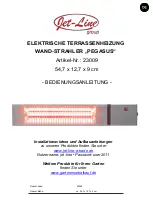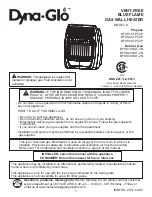
3
Safety instructions
Only competent and trained persons (ex-
perts) may install and repair the Truma
product and carry out the function test, in
accordance with the installation and opera-
ting instructions and the currently accepted
technical regulations. Experts are persons
who, based on their specialist instruction and
training, their knowledge and experience with
Truma products and the relevant standards,
can carry out the necessary work properly and
identify potential hazards.
To ensure safe and proper use, carefully
read and observe the operating instruc-
tions and other documents supplied with the
product, and keep them in a safe place for
future reference. The respective valid laws, di-
rectives and standards must be observed.
Not following the rules in the operating and
installation instructions can result in serious
material damage and serious risk to the health
or life of persons. The appliance's operator or
user is solely responsible for such damage.
The use of upright gas cylinders from
which gas is taken in the gas phase is
mandatory for the operation of gas regulators,
gas equipment and gas systems. Gas cylinders
from which gas is taken in the liquid phase
(e.g. for fork lifts) must not be used, since they
would result in damage to the gas system.
What must I do if I smell gas?
– Avoid ignition sources, e.g. extinguish all
naked flames, do not actuate any electrical
switches or use any mobile phones or radios
in the vehicle, do not start the vehicle's en-
gine, do not operate any appliances, do not
smoke.
– Open windows and doors.
– Evacuate all persons from the vehicle.
– Shut off gas cylinders and/or shut off the gas
supply from the outside.
– Have the entire gas system inspected and
repaired by experts.
– Do not put the gas system back into opera-
tion until after it has been inspected and
repaired.
Danger of toxic exhaust fumes! The
heater's exhaust can be toxic in enclosed
or poorly ventilated spaces (e.g. garages, work-
shops). If the vehicle is parked in such rooms:
– Shut off the fuel supply to the heater.
– Switch the heater off on the control panel.
An open roof window / lifting roof in the
vicinity of the exhaust cowl may allow
exhaust gas to enter the interior of the vehicle
The heater may only be operated when the
roof window / lifting roof is closed.
Danger of fire / explosion during refuelling!
The appliance must not be operated dur-
ing refuelling:
– the vehicle,
– the caravan's towing vehicle or
– other appliances.
Switch off the LP gas appliance at the control
panel. Shut off the gas supply to the LP gas
appliance. Make sure that the LP gas appli-
ance can definitely not be switched on under
any circumstances.
Possible injury / material damage if the
heater is operated without a cover. Due
to hot surfaces on the heat exchanger, operate
the heater only with the cover fitted.
Danger of explosion due to improper re-
pairs or modifications to the gas system.
Only experts may carry out this work.
Repairs to the heater and the burner noz-
zles may only be done by experts.
A new O-ring must be fitted whenever the
exhaust gas system has been removed!
The 30 mbar operating pressure of the
gas supply must correspond to the appli-
ance's operating pressure (see type plate).
The appliance, the gas system and the
exhaust duct for the combustion prod-
ucts must be inspected by a recognised expert
in accordance with the national regulations
(e.g. DVGW Worksheet G 607 in Germany) or,
if there are no such regulations, at least every
two years.
– A recognised specialist must carry out a leak
test after changes have been made to the
liquid gas system.
– The vehicle owner is responsible for having
the check carried out.


























